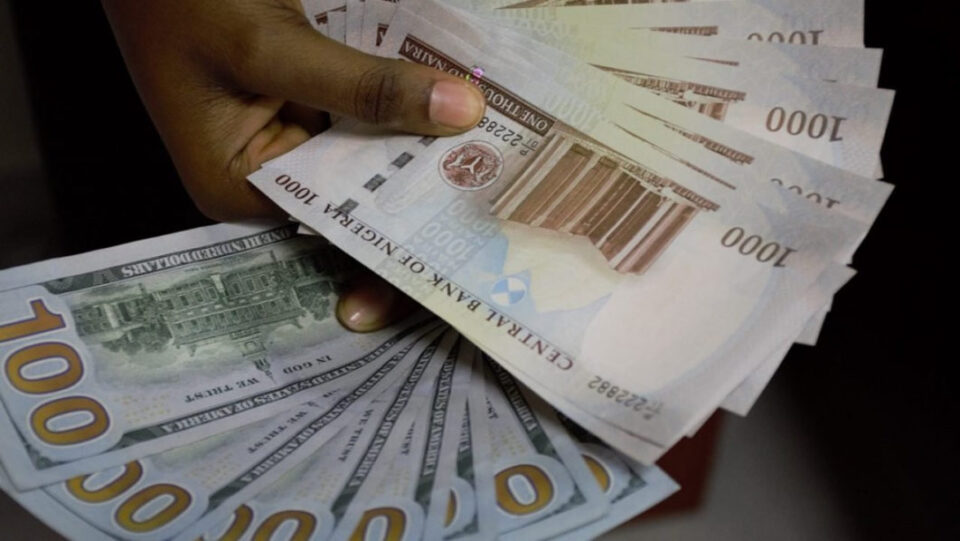
Naira Declines to N1,602.63/$ in Black Market
After trading at the Nigerian Foreign Exchange Market (NFEM) on Tuesday, the naira depreciated slightly by 0.2 percent as the dollar was quoted at N1,602.63 compared to N1,599.93 seen on Thursday last week before the Easter holiday, data from the CBN showed.
The naira closed flat, steadying at N1,610 per dollar in the parallel market, also known as the black market, according to data collated from street traders and online platforms.
The NAFEM window recorded an inflow of $1.42 billion compared to $847 million from the previous week, a report by Coronation Merchant Bank Research. The CBN accounted for 50.60 percent of the total inflow. Foreign Portfolio Investors (FPIs) earned 8.61 percent; non-bank corporates brought in 25.14 percent; exporters, 12.99 percent; while other sources accounted for 2.66 percent.
Last week, the naira gained 0.24 percent week/week against the US dollar in the official spot market, closing at N1,599.93/$. The one-month forward rate closed at N1,642.03/$, with the 3-month forward contract rate closing at N1,720.49/$. The six-month forward contract closed at N1,802.37/$ as the one-year forward rate traded at N1,979.27/$.
According to data from CBN, the gross foreign reserves decreased by 0.39 percent w/w to close at $37.88 billion as of April 16, 2025. Turning to the Chinese Yuan, the naira lost 0.44 percent against the Chinese Yuan (CNY), to close at N219.16CNY/N.
Net foreign exchange inflows into the Nigerian economy declined to $4.79 billion in January 2025, down from $5.01 billion recorded in December 2024, representing a 4.4 percent drop, according to the latest data released by the CBN.
The CBN attributed this decline to reduced inflows through its own channels, even as total foreign exchange inflows into the economy also dipped.
Total foreign exchange inflows for January stood at $9.63 billion, a decrease from the $10.17 billion reported in December. Correspondingly, outflows fell to $4.84 billion in January from $5.17 billion the previous month. The lower figures on both sides reflect a slowing activity in the foreign exchange space, especially in transactions routed through the apex bank.
The CBN’s economic report for January highlighted that inflows through the CBN declined significantly to $2.33 billion, compared with $4.09 billion in December. Meanwhile, autonomous inflows rose to $7.31 billion from $6.08 billion in the preceding month, indicating an increased activity by FX market players and non-CBN sources.
On the outflow side, funds exiting through the CBN also declined to $3.80 billion from $4.16 billion, while autonomous outflows slightly increased to $1.04 billion from $1.01 billion recorded in December.
The movement in flows led to a net outflow of $1.47 billion through the CBN in January, a stark contrast to the marginal net outflow of $0.07 billion in December. On the other hand, net inflows from autonomous sources improved to $6.26 billion in January, up from $5.07 billion a month earlier, reinforcing the increasing role of private sources in the FX ecosystem.
In terms of exchange rate movements, the naira maintained stability at NFEM, closing at N1,599 per dollar on Thursday, according to official data from the CBN. The naira also appreciated by N5 in the parallel market, commonly referred to as the black market, where it was quoted at N1,605 per dollar, compared to N1,610 previously.
During the review period, the naira gained strength at the NFEM. The average exchange rate appreciated by 1.16 percent, improving to N1,535.94 per dollar in January from N1,553.73 in December.
Similarly, the end-of-month rate showed a stronger gain, with the naira appreciating by 3.90 percent to close at N1,478.22 per dollar, compared to N1,535.82 in the previous month.
Additionally, the average foreign exchange turnover at the NFEM rose significantly by 18.30 percent, reaching $408.49 million in January, up from $345.30 million in December. This increase indicates heightened trading activity in the official market, even amid the overall slowdown in aggregate inflows.
Despite the decline in reserves, Nigeria’s external reserve position remained strong and well above global benchmarks. As of the end of January 2025, external reserves stood at $38.88 billion, down from $40.19 billion at the end of December. According to the CBN, this level of reserves is sufficient to cover 8.82 months of imports of goods and services or 13.20 months of imports of goods alone, thereby maintaining a buffer against external shocks.
